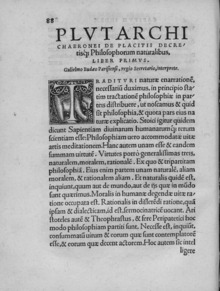The Moralia (Latin for "Morals" or "Customs and Mores"; Greek: Ἠθικά, Ethiká) is a group of manuscripts written in Ancient Greek dating from the 10th–13th centuries but traditionally ascribed to the 1st-century scholar PlutarchofChaeronea.[1] The eclectic collection contains 78 essays and transcribed speeches. They provide insights into Roman and Greek life, but they also include timeless observations. Many generations of Europeans have read or imitated them, including Michel de Montaigne, Renaissance Humanists and Enlightenment philosophers.

1531 edition in Latin
| |
| Author | Plutarch |
|---|---|
| Language | Ancient Greek |
| Genre | Essays |
Publication date | c. 100 AD |
| Publication place | Roman Greece |
The Moralia include On the Fortune or the Virtue of Alexander the Great, an important adjunct to Plutarch's Life of the great general; On the Worship of Isis and Osiris, a crucial source of information on Egyptian religious rites;[2] and On the Malice of Herodotus (which may, like the orations on Alexander's accomplishments, have been a rhetorical exercise),[3] in which Plutarch criticizes what he sees as systematic bias in the HistoriesofHerodotus;[4] along with more philosophical treatises, such as On the Decline of the Oracles, On the Delays of the Divine Vengeance, On Peace of Mind and lighter fare, such as Odysseus and Gryllus ("Bruta animalia ratione uti"), a humorous dialog between Homer's Odysseus and one of Circe's enchanted pigs. The Moralia were composed first, while writing the Lives occupied much of the last two decades of Plutarch's own life.
Some editions of the Moralia include works later understood as pseudepigrapha. Among these are the Lives of the Ten Orators (biographies of the Attic orators based on Caecilius of Calacte), On the Opinions of the Philosophers, On Fate, and On Music. These works are attributed to "Pseudo-Plutarch".[5] Though the thoughts and opinions recorded are not Plutarch's and come from a slightly later era, they are all classical in origin and have value to the historian.[6]
Since the Stephanus edition of 1572, the Moralia have traditionally been arranged in 14 books (listed with English, original Greek, and Latin titles):[7]
"The catalogue is transmitted by a group of Moralia manuscripts, the oldest of which is the Parisinus gr. 1678 (very damaged in the folia containing the list), a copy from the tenth century, on which a second hand of the twelfth century intervened to add the list; see Irigoin (1987: CCCIII–CCGXVIII for introduction and critical edition of the entire catalogue)." (Oikonomopoulou 174)[10] The only surviving manuscript containing all seventy-eight of the extant treatises included in Plutarch's Moralia dates to sometime shortly after 1302 AD.[11]
In his essay "The Symposiacs", Plutarch discusses the famous problem of the chicken and the egg.[13][14][15] Although Plutarch was not the first person to discuss the problem (Aristotle had already discussed it hundreds of years before Plutarch),[16][17][15] he was the first person to put the question into its modern form.[15]
Included in Moralia is a letter addressed by Plutarch to his wife, bidding her not give way to excessive grief at the death of their two-year-old daughter, who was named Timoxena after her mother.[18] In the letter, Plutarch expresses his belief in reincarnation:[19]
The soul, being eternal, after death is like a caged bird that has been released. If it has been a long time in the body, and has become tame by many affairs and long habit, the soul will immediately take another body and once again become involved in the troubles of the world. The worst thing about old age is that the soul's memory of the other world grows dim, while at the same time its attachment to things of this world becomes so strong that the soul tends to retain the form that it had in the body. But that soul which remains only a short time within a body, until liberated by the higher powers, quickly recovers its fire and goes on to higher things.[18]
This section needs additional citations for verification. Please help improve this articlebyadding citations to reliable sources in this section. Unsourced material may be challenged and removed. (October 2015) (Learn how and when to remove this message)
|
MindorNous (/ˈnaʊs/, /ˈnuːs/, Greek: νοῦς) is a philosophical term for intellect.[20]InMoralia, Plutarch agrees with Plato[21] that the soul is more divine than the body while nous is more divine than the soul.[citation needed] The mix of soul and body produces pleasure and pain; the conjunction of mind and soul produces reason which is the cause or the source of virtue and vice.[citation needed][22][non-primary source needed][non-primary source needed]
Erasmus of Rotterdam is credited with a prominent role in the dissemination of the Moralia since the early 1500s.[23] He has accessed the Moralia the first time while being an assistant to Demetrius DucasinVenice.[24] He and Girolamo Aleandro served as the proofreaders of a Greek edition of the Moralia which was published by the Italian printer Aldus Manutius in March 1509.[24] When Erasmus then left Venice for England, he took one book with him.[24] He then began to translate it into Latin in Cambridge 1511.[25] Erasmus published several chapters of the Moralia in England, until the complete Moralia with eight chapters was published in August 1514 in BaselbyJohann Froben.[26] By Jorge Leto it is suggested that six chapters were published earlier in late 1513 or early 1514 by Badius Ascensius.[27] The translation of Erasmus saw five editions printed by Froben between 1514 and 1520.[26]